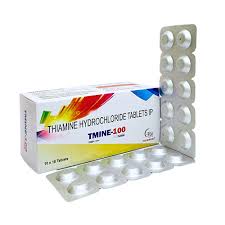Here is the detailed pharmaceutical profile for:
💊 Thiamine Tablet 100 mg
(Vitamin B1)
✅ DESCRIPTION
Thiamine (Vitamin B1) is a water-soluble vitamin essential for carbohydrate metabolism and neural function. It is a coenzyme in the metabolism of pyruvate and branched-chain amino acids, playing a key role in energy production and nerve signal transmission.
⚖️ COMPOSITION
- Each tablet contains:
- Thiamine hydrochloride (Vitamin B1) … 100 mg
- Excipients … q.s.
🧪 NATURE
- Solid oral dosage form
- Typically a white or off-white tablet
- Odorless, tasteless or slightly bitter
📌 USES
- Treatment and prevention of thiamine deficiency
- Management of:
- Beri-beri (dry/wet)
- Wernicke’s encephalopathy
- Peripheral neuropathy
- Alcoholic neuritis
- Maple syrup urine disease (supportive)
- Malabsorption conditions (e.g., chronic diarrhea)
- Supportive in diabetes, heart failure, dialysis
🌟 ADVANTAGES
- Crucial for ATP (energy) generation
- Supports nervous system and cardiac health
- Well tolerated and effective
- Essential in alcohol withdrawal therapy
⚠️ PRECAUTIONS
- Monitor in cases of liver/kidney disease (rare interactions)
- Give with caution in severe deficiency (risk of paradoxical worsening if not supplemented carefully)
- Pregnancy Category A – safe to use
❌ CONTRAINDICATIONS
- Known hypersensitivity to thiamine or components
💢 SIDE EFFECTS (Rare)
- Mild allergic reactions (rash, itching)
- Gastrointestinal upset (nausea, stomach discomfort)
- Very rare: anaphylaxis (usually with IV forms)
💊 DOSAGE & ADMINISTRATION
- Typical oral dose:
- Adults: 50–100 mg/day in deficiency
- Severe cases: oral or parenteral dose up to 300 mg/day
- Take after meals for better absorption
📦 PACKING
- Strips of 10 or 15 tablets
- May also be available in bulk bottles for institutional use
- Clearly labeled with strength and batch info
🧊 STORAGE
- Store at below 25°C
- Protect from light and moisture
- Keep away from children

